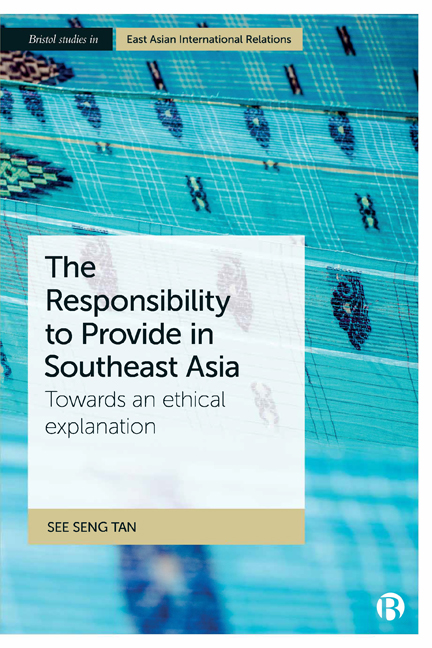Book contents
- Frontmatter
- Dedication
- Contents
- List of Tables
- List of Abbreviations
- Acknowledgements
- 1 Towards an Ethos of Responsibility in Southeast Asia
- 2 The Responsibility to Protect (R2P) and Responses from Southeast Asia
- 3 Towards a ‘Responsibility to Provide’ (R2Provide) in Southeast Asia
- 4 Institutionalizing Security Regionalism: Responsibility as ‘Response Ability’
- 5 Responsible Provision in HADR, Conflict Management and Human Rights
- 6 Towards the Responsible Management of Disputes in Southeast Asia
- 7 Communitarianism, Liberalism and the Limits of Responsibility in Southeast Asia
- 8 Levinas and the Responsibility to Provide in Southeast Asia
- 9 The Responsibility to Provide: Implications for the Region and Beyond
- Notes
- Bibliography
- Index
5 - Responsible Provision in HADR, Conflict Management and Human Rights
Published online by Cambridge University Press: 02 March 2021
- Frontmatter
- Dedication
- Contents
- List of Tables
- List of Abbreviations
- Acknowledgements
- 1 Towards an Ethos of Responsibility in Southeast Asia
- 2 The Responsibility to Protect (R2P) and Responses from Southeast Asia
- 3 Towards a ‘Responsibility to Provide’ (R2Provide) in Southeast Asia
- 4 Institutionalizing Security Regionalism: Responsibility as ‘Response Ability’
- 5 Responsible Provision in HADR, Conflict Management and Human Rights
- 6 Towards the Responsible Management of Disputes in Southeast Asia
- 7 Communitarianism, Liberalism and the Limits of Responsibility in Southeast Asia
- 8 Levinas and the Responsibility to Provide in Southeast Asia
- 9 The Responsibility to Provide: Implications for the Region and Beyond
- Notes
- Bibliography
- Index
Summary
Introduction
As we have seen, the domains of security cooperation in Southeast Asia sanctioned and supported by the ASEAN-based frameworks include humanitarian assistance and disaster relief, counterterrorism, maritime security, cyber security and the like. Of late, there have been hints that responsible provision could eventually extend to cover assistance to Southeast Asian countries in the area of conflict management, not least because the terrorism threat to Southeast Asia has evolved in substance and style, which in turn has prompted regional states to introduce new methods and to muster new actors – the military in particular – to the ‘war on terror’. The difficulties facing Philippine security forces in their efforts to root out ISIS affiliates occupying Marawi in the southern Philippine island of Mindanao have reportedly elicited offers of assistance from Indonesia, Malaysia and Singapore. In response, the Duterte administration has accepted an offer of military assistance from Singapore out of concern that further deterioration of the situation ‘would cause instability to the rest of ASEAN’ (Channel News Asia, 2017). More recently, in response to the burgeoning Rohingya refugee crisis as a result of the Myanmar military's offensive – some have called it a genocidal campaign – against Rohingya ‘insurgents’, regional countries such as Indonesia, Malaysia and Singapore have variously made offers of aid and assistance to help alleviate the crisis (The Straits Times, 2017a).
To the extent that these neighbourly acts constitute efforts in conflict management, the R2Provide arguably approximates the ‘sovereignty as responsibility’ concept proposed by Deng and associates (Deng et al, 1996). Yet it should be noted that nowhere in the Southeast Asian practice is the notion of outside intervention entertained. Whilst Southeast Asian countries may agree with Deng concerning the putative responsibility and accountability of states to both their domestic and external constituencies, social persuasion and peer pressure, rather than outright coercion, serve as the principal means through which provider countries work with prospective recipient countries to reach consensual outcomes (Tan, 2013a). In this chapter, we explore the exercise of responsible provision in the three areas, the first being HADR, and another two areas from which the region has traditionally kept its distance because they constitute the realm of ‘domestic’ or ‘internal’ affairs of states, namely conflict management and human rights.
- Type
- Chapter
- Information
- The Responsibility to Provide in Southeast AsiaTowards an Ethical Explanation, pp. 79 - 100Publisher: Bristol University PressPrint publication year: 2019



